A Conversation with Elizabeth Butters
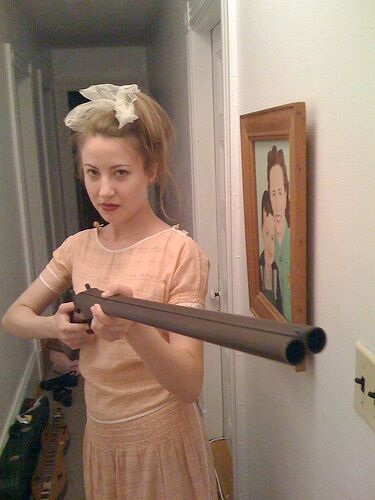
(Part 1)
(June-August 2009)
At the beginning of the year I was doing a late-night YouTube search to see whether there were any videos of The Gun Club doing "Jack On Fire." I didn't find any, but I did find a video of an unusual woman singing "Jack On Fire"—except she sang it in the manner of a stark folk song. This was Elizabeth Butters: one part Bonnie Parker, one part Maybelle Carter, two parts Addie Pray. Or, as my more concise friend Amy described her, "the adorable singer girl with the shotgun."
Turn on the radio or a TV station playing videos and you're doing better than I if you can find much of anything with any backbone. Recently I was noticing the fret buzz on the 1971 hit "Ain't No Sunshine" and wondering whether inadvertent fret buzz or string squeak—or anything inadvertent or uncalculated—would be allowed on pop recordings nowadays. There seems to be an awful lot of music out there that stakes no claim.
Covering "Jack On Fire," on the other hand, takes gumption, something Elizabeth Butters has to spare. Somehow she manages not only to turn it into a folk song almost by sheer tone of voice alone but, even more remarkably, she makes it feel as though she's turning it back into a folk song. If Ute Lemper specializes in interpreting Kurt Weill, Butters specializes in re-interpreting pretty much anything she decides to sing. Though she performs mostly traditional and folk songs, she can make you feel as though you're hearing them for the first time by threading them through her own identity. "99 Year Blues," for example, isn't a number I would have been able to envision as a good fit for her, but she succeeds in putting her own shape to it, to the extent that now when I think of the song, her voice mixes with that of Julius Daniels in my head. My favorite of the songs I've heard her perform, her version of Elizabeth Cotten's "Shake Sugaree," is hard to top for diction and charm.
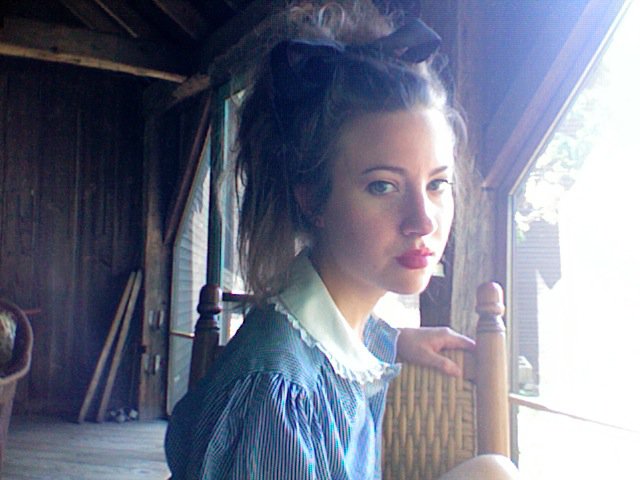
Some people react to folk music—or even to the mere term itself—as if they'd like to re-enact Belushi's response in Animal House. But this ain't your "I Gave My Love A Cherry"-type stuff. Though Butters never comes across as morbid, her choice of songs shows a strong mindfulness of mortality. And how wouldn't songs of melancholy, mayhem, and murder—whether plaintive blues or Appalachian murder ballads and death songs—be augmented by the agreeable incongruity of a guileless, honey-caramel voice? April March, a singer in some ways similar to Butters, told me her number one vocal influence was the child actor Mark Lester, because he didn't use vibrato in his singing. I can imagine April March liking Elizabeth Butters quite a bit. Affectation just doesn't seem to be in her nature.
A longtime student of traditional music, Butters hosted a radio show called "Hell Hounds and House Carpenters" for several years and until recently worked in the Passim Archives at Cambridge's famous Club 47 ("I used to catalog, do oral histories, write things, do research, organize shows") but while she is serious about folk music, she doesn't have the overly earnest cast that many folk singers seem to have, or adopt. She laughs—a lot—and of her performances has said, "Mistakes are an integral part of my act," a comment that highlights an even more integral part of her act: her personality. She can be seen on video shrugging or sheepishly smiling before or after a song and when she downplays or pokes fun at herself, it's clear she's not being disingenuous. Her stage banter can be dryly hilarious. In one video she introduces a song with, "The next song is off the Anthology of American Folk Music, but we do it in a minor key. I won't say where from, because it'll break our aesthetic." In another, in the course of trying to draw out her guitar accompanist on stage, she says of Gone with the Wind, "The special effects were great!" and then assures the laughing audience that she is "dead serious."
She's definitely serious about the music, and as much fun as she has with it, her love of the past is in no way a pose. (Her MySpace name, winslowhealthandhygieneseries, should give you some indication of her preoccupations.) She strives to be faithful not only to a period's music, but also to its look. She brings to her work an archivist's love of authentic clothing, as you'll see from the photos interspersed throughout both parts of this interview (making this is the first interview I've done that includes costume changes). Her whole demeanor and presentation approach performance art (but in a good way). Even her Halloween costumes are vintage,
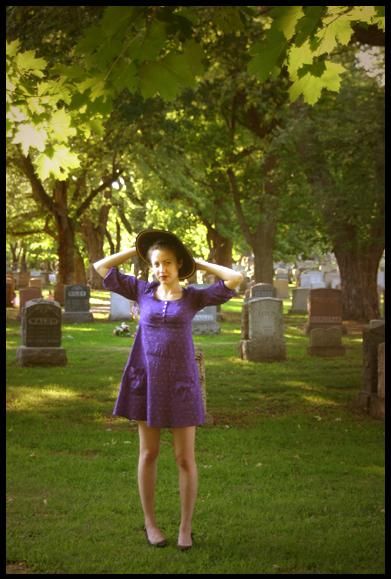 so the first time I sent a text message to her phone number, I didn't know whether she'd even receive it—I'm pretty sure 1930s Bakelite rotary telephones weren't set up for SMS. (Though Elizabeth does have a cell phone, she says she sort of wishes she didn't.) She has a record coming out in February 2010 entitled Elizabeth Butters sings Folk blues for Appalachian dulcimer and guitar (you can buy it from Top Magic Records) and although it will likely be available in CD and MP3 formats, to Elizabeth it's not a record if it's not available as a real record: on vinyl. And so it will be.
so the first time I sent a text message to her phone number, I didn't know whether she'd even receive it—I'm pretty sure 1930s Bakelite rotary telephones weren't set up for SMS. (Though Elizabeth does have a cell phone, she says she sort of wishes she didn't.) She has a record coming out in February 2010 entitled Elizabeth Butters sings Folk blues for Appalachian dulcimer and guitar (you can buy it from Top Magic Records) and although it will likely be available in CD and MP3 formats, to Elizabeth it's not a record if it's not available as a real record: on vinyl. And so it will be.
Doc: If you had put out an album during the Cambridge Folk Revival, what would you want the back of the album cover to say about you?
Elizabeth Butters: You know, it's funny that you ask that, because I am putting out an album, and it's gonna look pretty much like the records in the folk revival, so I just had to pick what I'd put on the back. I think I'm going to use this article that Camille Pandian wrote for the local paper, because it pretty much doesn't describe my music at all. It describes the way I look and my mannerisms. I figure when people listen to the record, they'll hear the music, so they don't really need someone to tell them about it. Plus I will have a description of each of the songs—why I picked it and its history.
I'm sorry, I'm not really answering your questions, am I?
You're doing fine. There's no template. I liked your MySpace description, where you say that you sound “like a bird chirping about death.”

I used to play the dulcimer a lot more often than I do now. I think that brings out—the dulcimer sounds really chirpy or really gloomy, depending on the tuning. So I think my voice sounds chirpier when I'm playing that instrument. It brings out a more bird-like sound.
One of the distinctive things about your vocal style is that you sing straight tone. You don't really use vibrato. Have you always sung that way?
Yeah, I have. I never took—and I really don't want to take—voice lessons. For the purposes of what I do, I don't really like a trained voice. I always took chorus and I hated it every year. But I never quit. I guess I always thought the people who did a capella groups after school were really nauseating, and they oversang all the time, and the expressions on their faces while they're singing are kind of nauseating [laughs]. So I don't really like to get too into things that I'm . . . I don't like to force emotion. Do you know how some people try to put “soul” into something? I don't try to do that [laughs].
It sounds terrific, though.
Oh, thanks. That's really sweet. It's nice for you to ask about my music, because I don't really think of myself as a musician.
Why's that?
I guess I'm more a writer than anything else. I didn't write any of the songs. I do arrange them myself, but I don't read music, I'm not naturally gifted in, like, sounding things out too well. I taught myself most of the songs that I sing, but I pick simple songs on purpose, because I just never practice guitar. I'm not really interested in the technical aspects of playing, even though I am interested in the technical part of recording, just because I like getting a special sound.
But that would probably be true of a lot of the people who originally sang a lot of the songs that you do.
Yeah! Yeah, I guess I think so, too. I guess what I mean is I feel that most of the artistry involved in what I do is picking the songs, and the order that I sing them in. Because they all follow a theme, and themes are very important to me. That's why I wear certain clothes and I might wear, like, a different-colored dress if the set list is different, or certain kinds of—you know how some kinds of collars are more innocent looking than others? If you wear Peter Pan collars, or bib collars, on your dress, they're kind of innocent looking? I like to wear kind of innocent-looking things and sing songs that are kind of sad and have to do with death or murder. Some of that's by accident—it just happens that way, but I think it's more an art of integration or synthesis than it is me being a good singer.
I think you might be selling yourself short because while I'm sure for the people who see you play live, the order, for example, would be important, but someone such as I, who ran across you on YouTube, isn't seeing things in a particular order, and yet it still has a power to it.
Well, thank you. That's really nice to hear. I am hearing more and more that people like the singing and the playing. I'm lucky that I have such—I don't know who is in the videos on the Internet, but I'm really lucky that I've gotten to play with very good backing people, like Eli Smith, he's really amazing at the clawhammer banjo. He runs a radio show that he's had Pete Seeger and John Cohen and Peter Stampfel on. He just picks everything up in two seconds, so I don't need to practice with him.
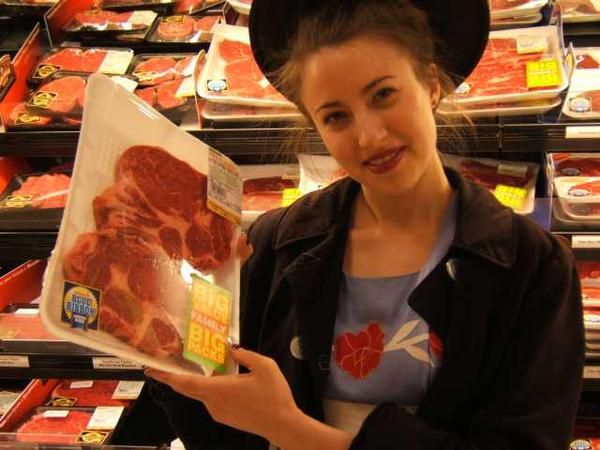
The way I found you was that I was looking on YouTube to see whether they had any videos of The Gun Club doing “Jack On Fire.” (They didn't.) And there you were.
Oh, really? Yeah, I love The Gun Club.
Do you listen to a lot of Gun Club? Or just that song?
I just really like the album Fire of Love.
That's a hell of an album.
Yeah. I think that the cover of that record's amazing, too, because it's so close to being racist, but it isn't at all. I appreciate work that leads people to question their own feelings on race and racially charged images. I guess I like things that are kind of exoticizing something, that someone who didn't know better would think that it's exoticism, but it's actually much deeper than that. [*]
Jeffrey Lee Pierce had a lot of lyrics like that, too. In fact, “Jack on Fire” does. That's actually something I wanted to ask you about. I heard, I think, three recordings that you had done of that song, and on one of them you sang, “I will fuck you till you die” (like Jeffrey Lee Pierce does) and the others you sing, “I will love you till you die.” Not that the whole song makes a giant bunch of sense, but "I will love you till you die" doesn't work with the next line: "and it'll be understood that I am bad." So I was wondering, is it the audience that determines that?
Yeah. Yeah. Like if there are children in the audience, I usually don't say the fuck part. I actually stopped playing that song for a while, because I guess some boys that I'm friends with were like, “Oh, so-and-so thought that you were looking at him when you were singing that song,” and I started to feel kind of weird about it. It's unfortunate, because I really like the song, but I've been singing it for so long that I can't really control who I might look at. Furthermore, you usually have lights pointed at you, and you can't even see anyone. I guess I was so embarrassed at the fact that someone thought that I might have been looking at him that I just stopped doing that for a while.
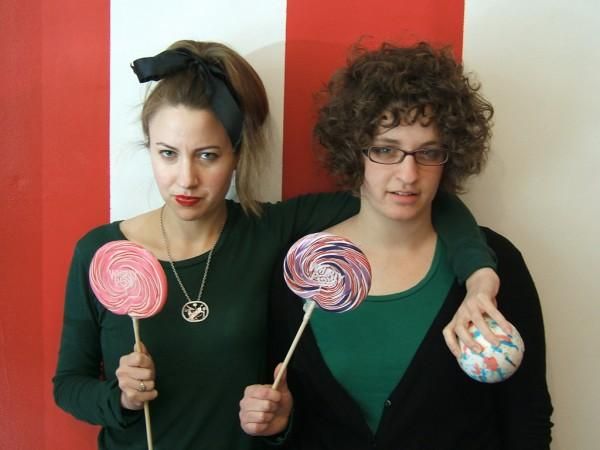
I love that someone would internalize it like that. “Oh, she was looking at me!” Instead of thinking, for example, "Omigod, till I die? I'm gonna DIE??"
Yeah. I know. It's kind of weird. I think that's a really neat song, 'cos of the thing about “Creole boys.” I think it's weird that it says “some Creole boys was a-lyin' dead” and “I used his blood.” Instead of the plural.
And he always sang it that way. It wasn't a mistake. That's the weird thing.
I know! I know. Every version I've heard. Yeah, see, I really like mistakes that just stick. It sounds better that way.
During one of those interviews on the Internet, you said, “Mistakes are an integral part of my act.”
I had to start viewing it that way because I make so many.
That's become one of my favorite quotations. I really like that.
Oh, thank you. That's really sweet.
I'm writing a book, and I want to quote that.
You should. That'd be really nice. What's your book about?
It's about the Mojave Phone Booth. It was a phone booth that was . . . out in the Mojave. Just in the middle of the desert. It got taken out by the government, unfortunately.
I'd like to read your book, when it's done. If you don't mind. I wrote a book, too.
What's your book about?
It's kind of about me. I mean, it's about me and my erstwhile obsessions with certain men. It's funny, because I wrote it when I was 21 and 22, and it's about things that happened when I was 19, so reading it—I don't like to admit that a few years makes you change, but I was sort of embarrassed, because it sounds like a very teen-aged me. But I have an agent for it in New York. I'm going to grad school for creative writing. That's what I'm trying to say is, I was so—this book was like my life for a year, and then I got kind of embarrassed of the subject matter, but now I'm getting kind of like into this mindset of thinking, no, it's okay, it's like a little confused Baby Me. It's just that it's a transitional phase in somebody's life.
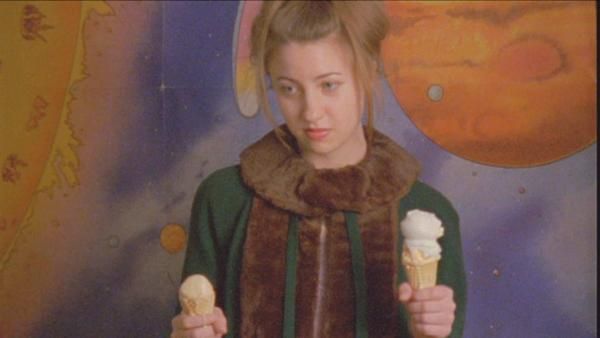
Where are you playing next?
I'm actually going to Detroit on Tuesday. I'm supposed to play in Detroit on the 24th with Danny Kroha.
I'm a big fan of a lot of Detroit bands. I like The Screws a lot right now.
You what?
The Screws. It's another Mick Collins band.
I'm excited. It's such a neat town, 'cos it's abandoned. Have you been there?
Yep. Detroit's an amazing place. It's sad, but you kind of halfway feel guilty for the delight that you're getting, driving around in this bombed-out city.
Yeah. That's really well put. I'm kind of bowled over by how much potential that place has. Because everyone thinks, “Oh, Detroit's such a mess, it's so dangerous, everything's abandoned, it's totally fucked,” but I think it has a lot more potential than Boston or New York City because it isn't congested.
It's wide open. All they'd have to do to bring that city back is declare it a tax-free zone, it would come back in five years.
It has so many beautiful buildings. Granted, they're boarded up, but you can tell it was such a mecca, when the cars were big. I can't believe they tore down that old train station.
They tore down Michigan Central?!?
They either did, or they're going to. Sorry to tell you that.
Once we'd gone over to Windsor, Canada for the afternoon, and in the late afternoon, when we were coming back, I said, “Wow, that's weird—the way the sun's hitting that building, it looks like you can see right through it.” And my friend said, “No—you ARE seeing right through it.”
Wasn't it built by the same person who built Grand Central Station?
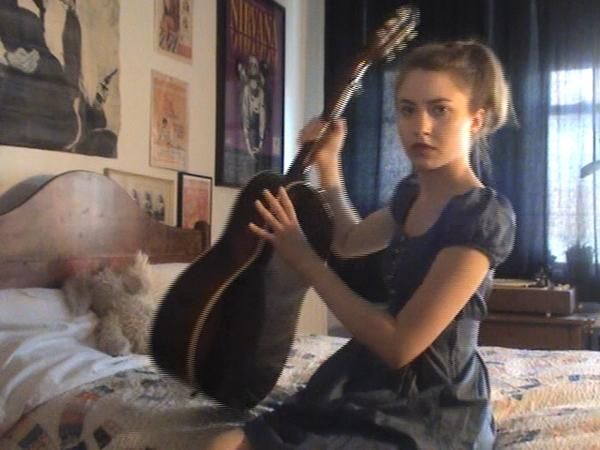
I think you're right about that. I wanted to ask you another question related to “Jack On Fire.”
You'll have to interrupt me sometimes, because I'm really spacey and tangential.
As long as you don't mind my circling around again. I notice that you're covering Blanche's cover version of it.
Yeah.
They kind of gave it a tune, because “Jack On Fire” doesn't really have a tune, but I noticed that you sang a Marty Robbins song, “They're Hanging Me Tonight.” That one does have a tune, but you changed the tune.
Oh? I didn't know I did change it! How did I change “They're Hanging Me Tonight?” Hey, how have you heard that?
It was on one of the videos, I think. Or it might have been on the Basement Radio interview you did. Or the Down Home one.
Oh. Could be. Did you see the video of me spitting?
Yeah.
That's got so many views. There are so many perverts out there.
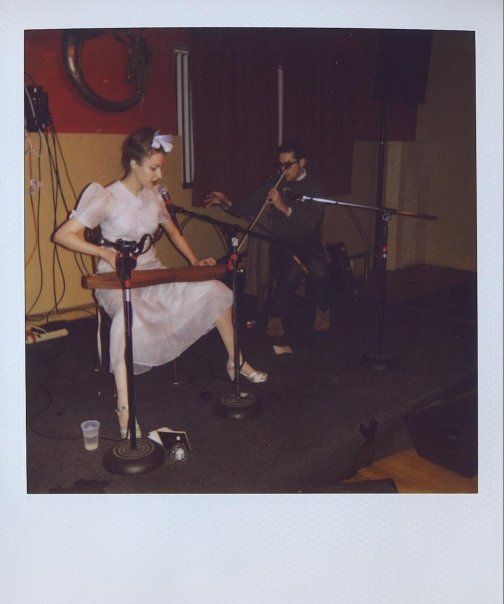
There's probably a special fetish for that.
I know! I thought about asking my friend to take it down, but I don't really think that just because some people are taking it in a dirty way means that—'cos we were just having a contest. I think it's fine. It's just funny, because that has 16,000 views and everything else has, like, 5! Somebody was writing me messages about that video: “Can you send me more videos of you spitting?”
Sorry, so . . . “They're Hanging Me Tonight”—did I just leave out some verses, or something?
No, it's a completely different tune. You'll have to listen to Marty Robbins's version of it. I thought maybe there was a—
I do! I listen to it a lot. I just wonder why I changed it, then?
It's different enough that it sounded like a conscious choice, is why I was asking.
I guess it was unconscious, then! The thing that I really do think that I arranged, though, something that sticks out to me as me arranging it, would be “Single Girl.”
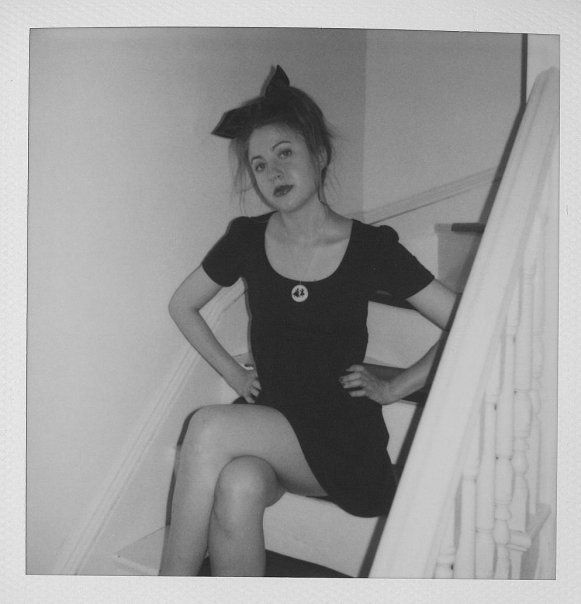
Yeah.
Because I'm not doing that at all like the Carter Family. I heard Jean Ritchie singing it unaccompanied, and I changed the unaccompanied version and made up the dulcimer part and changed the melody, and then it ends up being a lot closer to Roscoe Holcomb's version of that song. So that's like, quote, “my” version. But that's the only song I think I had much of a hand in.
Did you know that Jeffrey Lee Pierce was a big Marty Robbins fan?
I didn't, but it doesn't surprise me. I like that you like all of these garage rock bands, because some people just don't seem to see the connection, but folk music and all that rural stuff is very rough, a lot of it is, and so is garage rock, is very rough and raw. So it's good that you like both of those.
I think a lot of people don't realize where the music they listen to came from. It's a shame, because not only should the original people get “credit,” if that's the right word, but also just because it really enhances your enjoyment of it, when you can recognize that an old rock and roll song was an even older blues song.
It definitely enhances your enjoyment. Danny from the Gories—I guess he's in The Readies, now—he sent me this record of Niela Miller singing this song called “Baby Don't Go To Town,” and it sounds really similar to Jimi Hendrix's “Hey, Joe,” so I think he must have heard the garage rock versions of “Hey, Joe” and then spliced it with her song.
I think it's really cool when someone in her twenties is talking about Son House or Skip James. That's really not common.
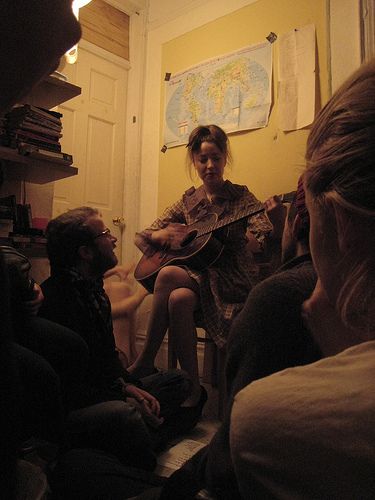
It's becoming more common, and I have to say that at first I was not happy about that, 'cos when I was in high school, I did not do any extra-curricular activities at school. I went to stay with my dad every weekend, and the weekends when I was at home for whatever reason, I just told everyone I was going away, so I never to went to a single party or a single dance, but I maintained semi-popular status, because everyone assumed, “Poor Elizabeth, she's forced to go away every weekend by her parents' custody agreement!” But I basically spent all my time taking baths and listening to records in the bathtub and collecting records and collecting old clothes, so when everybody got the Internet and then they'd start to hear stuff and say, “Oh, I've liked this forever,” it threatened my identity, kind of. I felt like, these people don't deserve to know about this! They weren't alone all the time when they were teenagers! All they had to do was click a button to find this stuff, and it shouldn't be like that! It's much more gratifying when you go to a store and you have to look for a record for a year, and then you find it, and it's amazing, and it's a big deal! But now, it's sort of nice to meet people that you have a connection with. I was just sort of looking at it from a jealous standpoint.
Like, “I was a punk before you were a punk.”
Yeah, exactly. I was sort of thinking, these people are going to steal my personality! That's a very immature part of me that's, thankfully, becoming less and less dominant.
I understand the impulse. Used to be, there'd be books or records that I would hunt after for, literally, years. And some I never did find, until the Internet. There's something to be said for that.
It's kind of a nice thing.
But I like being able to find more things, which the Internet makes possible. I wouldn't have found you, if not for the Internet.
Yeah. I feel like I've actually “met” people through MySpace who I really like—not, like, boyfriends (that's kind of lame—I'd be embarrassed to admit that)—but people who live in England, or something, whom I never would have met. It's just a complete double-edged sword, I guess, 'cos I think the problem with praising the Internet too much is that you forget that you would have more strong connections with people if you were actually with them, outside, in public. Because with MySpace and Facebook, if you just leave a comment for someone, you feel like, “I did my deed for our friendship for the day.” So you can kind of maintain superficial relationships. I don't mean superficial in negative way, just literally—you can maintain superficial relationships with everyone, but I think it also prevents you from having more close friends by you. I think it enables people to be more flaky.
On the other hand, you're able to have in-person relationships only with people that you're physically near. This way, you can be in contact with people all over the world.
Yes, that's true. I guess I just mean I notice sometimes people that I used to see a lot will just message each other saying, “Sorry I keep missing you!” And that's it for the week. There are definitely good things, too, about the Internet. I'm very upset about this digital radio thing, now. That's not good. They're going to stop analog radio forever, pretty soon.
They already did with television.
Isn't that scary?
If it was something that naturally developed, that's one thing, but if it comes from top-down, on order of the government, I don't like it.
I just think there's something magical about radio waves going through outer space, and somewhere, for the first time, Martin Luther King's “I Have A Dream” speech is playing in some distant part of the stratosphere. I guess it makes me really sad that we won't be able to use all the old radios anymore.
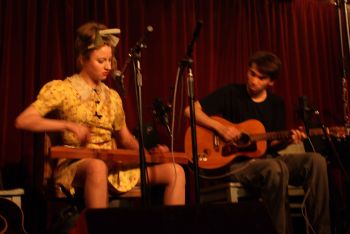
You should play out here in the West sometime.
I would love to. It might be possible in the next year, because the record's coming out within the next two or three months.
A cool place for you to play would be Club Congress, at the Congress Hotel in Tucson, because that's where the Dillinger gang stayed. It's how they got caught, too, because the Congress caught on fire and the firefighters rescued some of their luggage, heavy with tommy-guns and pistols, and the gang gave them big tips, and then the firefighters tipped off the cops. Then Dillinger was flown to Crown Point in Indiana, and he escaped, anyhow.
It seems like kind of a shitty thing to do, to accept big-money tips and then tattle on them. I think that's kind of cruddy. Maybe they got money from the government to rat. But maybe I can get together some of my friends and we can travel.
You mentioned Jim Kweskin earlier, and I'm curious whether you've done any work on Mel Lyman at all?
I know about Mel Lyman. He's dead. Or, you know—
Theoretically.
—yeah. I guess he is dead, because a friend of mine said he knows for sure that Mel Lyman is dead, because he was at the funeral.
Was the body there, though? You can always have a funeral.
He said yes. I know that the cult, or commune, broke up the Kweskin Jug Band.
Yeah. Have you ever met Jim Kweskin?
Yes, I have.
How was that?
He's one of my top five favorite musicians. He knows who I am by face. I think he might know my name, but I don't think if I wrote him he would. He seems like a nice guy. He's one of the people that is still playing very well.
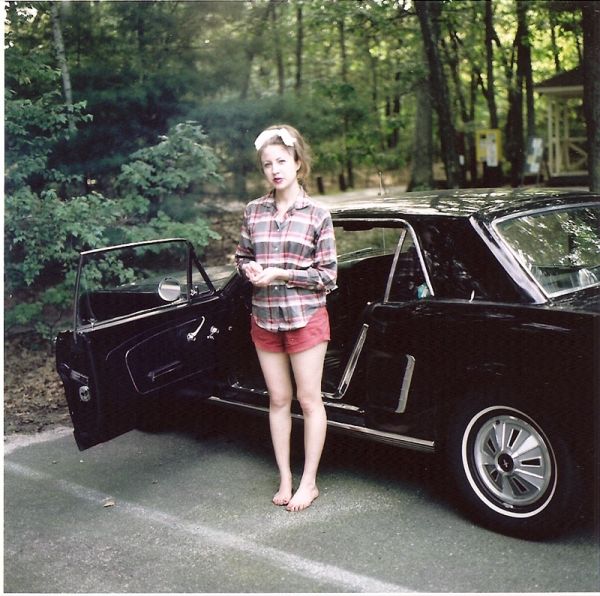
I love that Jim Kweskin's America LP.
Yeah, I really like the “99-Year Blues” and “Sugar Babe” off that.
I like the ones where Mel Lyman's in the background with that weird, crackly voice.
I like his harmonica playing a lot. It's kind of different. Jim Kweskin said, “Mel Lyman doesn't play the harmonica, he is the harmonica”[laughs]. Whatever that means.
You've been in some films?
I have some friends in this film cooperative called Red Bucket Films, in New York. Their first feature-length film got into Cannes, and their second feature-length got in, as well. I was in one of Zach's films, called The Mean Time. Zach Treitz is one of the founders of Red Bucket Films. I think that movie's playing in New York all this weekend. It's a short movie. I've been in a couple of things that nothing happened with, also.
Is that something you'd like to pursue more?
Yeah, I really would, 'cos I really like people telling me what to do. I really like acting if the part is something that's not that far from what I can do. I don't think someone can ask me to be a serial killer, if there's screaming. I'm not really an actor, but I like being in movies, 'cos (a) I'm obsessed with myself, and I like watching myself, and (b) I really like being part of someone else's art, when the pressure's off. You skip the big decisions and you just get to—if you have a director and cinematographer that you know do really nice things, it's a wonderful feeling to know that you're taking part in something that at least looks good. It's not that you can sit back. You still have to do work, and sometimes it's tedious, because it takes twenty times of saying something to get all the angles that they want, but you don't have to make your own creative decisions, really.
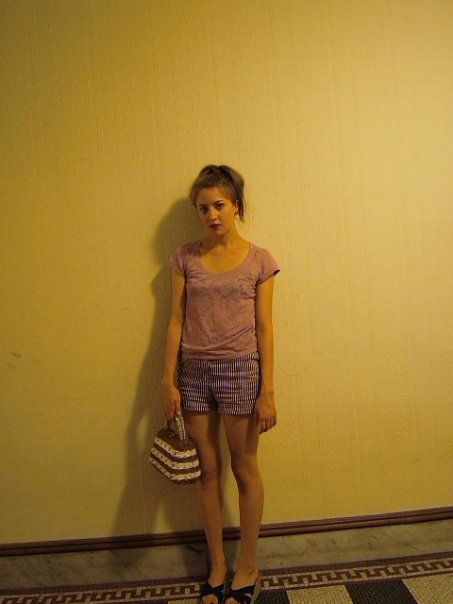
Do you feel pressure in that way when you're performing music?
Sometimes it feels like a chore.
Do you get stage fright?
Yeah. It completely depends on what mood I'm in that day, and who the people are that are in the audience. Sometimes I'm not nervous at all, but sometimes I get very nervous and I get sore throats.
Nervous sore throats?
Yeah, I get psycho-somatic sick.
They say that straight tone singing is harder on the throat.
Really?
Sounds counter-intuitive, but still.
That might be true, then. That's good to know.
What are your ambitions?
I'd like to release a 10-inch record that looks nice, has nice cover art and a nice sound—up to a point. I'd like to be able to sing in somebody's movie. I'd like to be able to perform in an old-time circus sideshow, with circus dancer costumes. I'd also kind of like to be in a rhythm and blues band with maybe another girl, and some boys that play the drums and nice-toned guitar. I'd like to be a trick rider in the circus, where you ride with one foot on one horse and one foot on the other.
(Continue to Part 2)
Update, 01apr2010: From a Gun Club interview where they were complaining about the failure of critics to get what they were doing:
Ward Dotson:"They didn't get Jeff's lyrics right. There's lyrics that sound sexist and sound racist but if you listen to them in the context of the song, the context of the album, the whole idea, they're not."
Pierce: "I really, really enjoy taking traditional lyrics out of a song like 'John Henry' and putting them into a song that's a complete mess. They would take a line like 'I'm gonna buy me a gun as long as my arm / And kill everyone who ever done me harm' and go, 'What a lunkhead line this is.' The New York Rocker said, 'What a lunkhead, stupid line this is, for anybody to say anything like this.' I stole the whole damned thing off of Furry Lewis—he wrote it in 1928! I never wrote that line."
Dotson: "And two months before that, they gave a rave review to some reissue of a Furry Lewis album!"
[Return]
|

